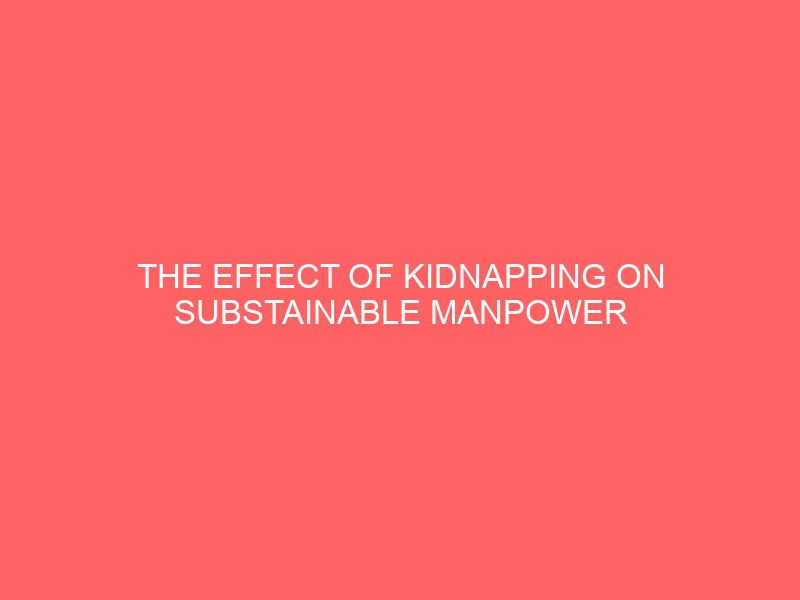Description
THE EFFECT OF KIDNAPPING ON SUBSTAINABLE MANPOWER UTILIZATION IN NIGERIA. A CASE STUDY OF KOGI STATE
ABSTRACT
This project examine the effect of kidnapping on sustainable manpower utilization in Nigeria, Kidnapping, abduction, hostage taking or by whatever name it goes, has had a long history dating back to time immemorial. This dysfunctional act has featured so conspicuously in recent times in Nigeria, as one of the social vices perhaps it could only be second to drug trafficking in global catalogue to crime. According to Adebayo(2011) Kidnapping is all over Nigeria. It is a national problem that has eaten so deep into the tissues of the nation. It is a problem that must be tackled nationally, The high unemployment rate in the state may has forced citizens to find other ways to make money, To ascertain whether cases of Kidnapping has been on the increase or not. methodology of this research study adopted the use of survey approach. The area of the study is Kogi, state, central Nigeria. The population of the study base on 2006 census in Kogi State is 3,314, 043 peoples. The sample size used is 1,300 from selected local government in Kogi State. The security agencies should be adequately equipped with necessary technology to enable carry out their duties effectively.
TABLE OF CONTENTS
Title Page – – – — – – – – – i
Approval Page – – – – – – – – – ii
Dedication – – – – – – – – – iii
Acknowledgement – – – – – – – – iv
Table of content – – – – – – – — – vi
CHAPTER ONE
INTRODUCTION
- Background of the Study – – – – – – 1
1.2 State of the Problem. – – – – – — – 4
1.3 Purpose of the Study – – – – – – – 5
1.4 Significance of the Study – – — – – – 5
1.5 Research Question- – – – – — – 6
1.6 Scope and Limitations of the Study – – – – – 7
1.7 Definition of Terms. – – – — – – – 7
CHAPTER TWO
LITERATURE REVIEW
2.1 Public Service and Service Delivery- – — – – – 9
2.2 Manpower and the Achievement of Organizational Goals – 13
2.3 Kidnapping: Nature, Purpose and Dimension- – – – 14
2.4 Sustainable Manpower Utilization in Public Services – – 27
2.5 Impact of Kidnapping on Sustainable Manpower Development- 30
2.6 Kidnapping and manpower Utilization – – – – 38
2.7 Challenges of Government in Curbing Kidnapping- – – 48
CHAPTER THREE
METHODOLOGY OF THE STUDY
3.1 Research Design – – — – – — – 59
3.2 Area of the Study – – – – – – – 59
3.3 Population of the Study – – – – – — – 61
3.4 Sample and Sampling Techniques – – – — – 61
3.5 Instrument for Data Collection – – — – – 62
3.6 Validation of Instrument – – — – – – 63
3.7 Reliability of Instrument – – – — – – 63
3.8 Method of Data Analysis – – – – – – 64
CHAPTER FOUR
DATA PRESENTATION AND ANALYSIS
4.1 Data Presentation and Analysis- – – – – 65
4.2 Discussion of Findings – – – – – – – 84
CHATPER FIVE
SUMMARY, CONCLUSION AND RECOMMENDATIONS
5.1 Summary – – – – – – – — – 88
5.2 Conclusion – – – — – – – – 89
5.3 Recommendations – – — – – – – 91
Bibliography
Appendix
CHAPTER ONE
INTRODUCTION
1.1 Background to the Study
Kidnapping, abduction, hostage taking or by whatever name it goes, has had a long history dating back to time immemorial. This dysfunctional act has featured so conspicuously in recent times in Nigeria, as one of the social vices perhaps it could only be second to drug trafficking in global catalogue to crime. According to Adebayo(2011) Kidnapping is all over Nigeria. It is a national problem that has eaten so deep into the tissues of the nation. It is a problem that must be tackled nationally. Kidnapping is growing daily in Nigeria. This criminal commerce paints an ugly picture of the already bettered image of Nigeria. This kidnapping rocket has become incurable disease. Kidnapping has become a life threatening ailment. For example, one can argue that there is no month in Nigeria when do not read on the page of newspapers about cases of kidnapping. Kidnappers now see kidnapping as a business that can never be stopped by any government in Nigeria, this is because the government of Nigeria is yet to take a bold step to find a lasting solution to this barbaric act.
Kidnapping is the act of taking a person or group of person into captivity for the purpose of collecting ransome. The act places a victim on hostage for the purpose of using the abducted to attain a goal. Therefore, to kidnap, there must be two parties which include the living-prey on one hand and the heartless-predator who are there to manipulate terror, in order to attain an outlined objective.
The Guardian (2009) documented that Governor Rotimi Amechi of Rivers State, Nigeria explained kidnapping as “using force to take away human beings.” There are many forms of kidnapping in Nigeria. They include, expatriate- oriented kidnapping. It was the militants who traditionally used this model of kidnapping to agitate for the economic and environmental rights of the Niger-Delta people. At that era of kidnapping in the Niger-Delta, the protagonists of this act of kidnapping used it to generate the interest and reaction of the Nigerian government and the world at large to the terrible environmental abuse meted on their society. Unfortunately, the manipulation of kidnapping Ukpong (2010) to enhance environmental agitations, soon gave way to its use as a tool for financial exploitation. It was primarily targeted at the expatriate oil staff in the region. Kogi State Governor, Godswill Akpabio has stated that kidnapping “which started in the Niger-Delta region has spilled to other parts of the country” (Thisday, 2010). Many expatriates working in Nigerian companies have been continually kidnapped to an extent that many foreign countries like USA and Canada, at different times, had declared interest in contributing their national resources towards the rescue of their citizenry that were trapped in kidnappers den.
The zero sum approach to politics in Nigeria that manifest in the form of machine politics and clientele-politics across the country, since the return of democracy to Nigeria in 1999, gave impetus to the kidnapping industry and its menace. This new phase launched kidnapping entrepreneurs operating the economy of violence. It is politically- motivated brand of kidnapping used by politicians to haunt their opponents. This form of kidnapping has grown as a tool in the hands of Nigerian politicians, with which they manipulated the means to their political end.
However, many members of the PDP argued that he did not merit the position he was vying for, and knowing that he has received the blessing of what has been popularized as the ‘Abuja Connection’ (strong support from the political god-fathers living in the Nigerian seat of power at the Federal Capital Territory, Abuja), the available option that could be used against him became the abduction of his aged father. The father’s abductors were alleged to have requested his resignation from the governorship-race or deposit huge sums of money into their coffers. The Guardian (2010) wrote that the kidnappers “demanded a ransom of N5 billion to cover the ‘political expenses’ arising from the PDP primaries.” Leo Chiegboka, spokesperson for Soludo Campaign Organization, opined that the Pa Soludo’s abduction was a price to be paid by Professor
Many famous and rich men and women have been a victims of kidnapping in the state. Among them are six passengers traveling from Abuja to Onitsha that was kidnapped in Okene local government area of kogi state. (https://www.thisdaylive.com/index.php/2017/02/08/six-kidnapped-in-kogi). At the height of this spate of kidnapping in Kogi State, individual, families, groups, businesses, Worship centers, educational establishments, government institutions and of course, the entire society suffered gravely as properties, monitory wealth, and time were wanted.
1.2 Statement of the Problem
The statement of the problem of this study discuss as follows:
- The high unemployment rate in the state may has forced citizens to find other ways to make money
- Government seems not to have done much as cases of Kidnapping still persists.
- Kidnapping seems to have contributed the hardship in the country since it has cut across the classes of people in the society as victims are allowed to cough out millions for the release through negotiations.
- Mobility of labour has to be reduce since people avoid places that are prone to kidnapping.
- Some trained manpower have turned down calls to do some of the technical work they are trained to do due to fear of been Kidnapped.
1.3 Purpose of the Study
The main purpose of the study are:
- To examine whether high unemployment rate has any bearing with cases kidnapping.
- To ascertain whether cases of Kidnapping has been on the increase or not.
- To determine whether Kidnapping has any bearing with the economic hardship in the country.
- To assess the extent to which Kidnapping has affected mobility of labour.
- To examine the extent of trained manpower that turned down calls due to fear of been Kidnapped in the state.
1.4 Significance of the Study
This study, being an exploration of a lingering and seemingly intractable and protracted social problem, will be of enormous significance to future researchers on kidnapping and similar violent crimes, especially since it is explored from a holistic perspective. It is hoped that this research would aid the various levels of government, policy experts and analysts in grasping the genuine causes and impacts of kidnapping. Ultimately, the study would contribute to closing the gap on the dearth of literature that exists on kidnapping, on the one hand, and other violent crimes, on the other hand.
This study will be of significant value relevant to individuals, families, groups, governmental and non-governmental agencies (especially faith-based organizations) involved in related criminal justice activity all over Nigeria. That is, the religious leaders, law enforcement agents (police and joint military task force) and other security and correctional agents interested in formulation, execution or reformation of the criminals among us
1.5 Research Questions
Based on the foregoing, this study seek to proffer answers to the following research questions:
- How has high unemployment rate contributed to Kidnapping in the state?
- Why has cases of kidnapping been on the raise on daily basis?
- To what extent has kidnapping contributed to the economic hardship in the country?
- To what extent kidnapping has affect the mobility of labour in the state?
- To what extent the fear of been kidnapped has affect trained manpower in the state?
1.6 Scope and Limitations of the Study
The relevant instances and practical inferences would be drawn from other North-centre states, and of course states in the core Lokoja. This work covers from 2010 – 2018.
On the panacea or praxis from the church or religion as a social organisation to ameliorate this dysfunctional behaviour, kidnapping, we shall make recourse to successfully organized religious strategies on troubling human challenges.
These are the constraints and limitations are as follows:
- Lack of time: the research work took allot of time to obtain the data information from the in Kogi State.
- Lack of funds: money for transport and buy other material for research delay the research work.
- Lack of material: there are no enough material to execute the research during research.
1.7 Definition of Terms
A brief explanatory remark on the key terms will be pertinent to aid a better understanding of the topic under study. The terms include the following : kidnapping, Abduction and Victim.
- Kidnapping : This is an unlawful as potation confinement of a person against his or her will. Kidnapping as a crime at common Law consisting of an unlawful restrain of a person`s liberty By force or show of force so as to send the victim into another country.
- Abduction : It is the unlawful carrying away of a woman for marriage or Intercourse.
- Crime: :The complexity of crime requires a conscientious reflection noting its tie with sin and morality in general. Okezie (2007) views crime as a “violation of a norm that has been entered into law and is backed by power and authority of the state to impose formal sanction”.
- Violent crimes: : A violent crime is any criminal offense, which involves the use of, or even threat of force or violence. Also, violent can be said to have occurred “when an offender uses or threatens to use violent force upon a victim”
- Deviance: :McLaughlin and Muncie (2001) defines the term deviance as “the aggregate of social behaviours, practices, acts, demeanours, attitudes, beliefs, styles or statuses which are culturally believed to deviate significantly from the norms, ethics, standards and expectations of society”.








Reviews
There are no reviews yet.